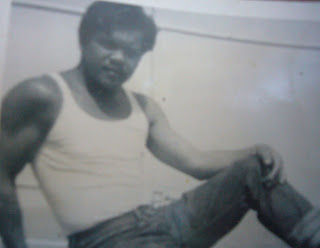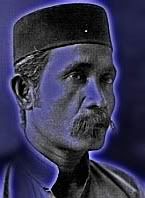The song of Sekölöh Paloh has been twice round the world and once nearly spilt out of his head. Ngah Musa shows me an old scar — very old — that runs down the nape of his neck. “This was from the knife of another sailor who attacked me from the back,” he says, sitting down again to his comfortable armchair by the window.

He produces an old picture of a man rippling with muscles, standing like a potential prize winner in the junior section of a Mr Trengganu Body Beautiful contest, taken, undoubtedly on some foreign shore. “That was taken when I wasn't feeling very well,” he says. Then, from the old envelope pops out another, muscles rippling even more alarmingly, a handsome youth sitting in the sunshine on the deck of a ship. He was feeling much better now.
“We Trengganu people don't leave home without knowing something,” he says, to explain how he acquitted himself in those parts throughout the known world. Fisticuffs here, parrying of blows there and Trengganu hands flying everywhere. “Something” is old Trengganu shorthand for
ilmu which translates into the
silat art of self-defence and maybe even the
ilmu baténg a bit of spiritual knowledge.
“There was a very famous man in Kuala Trengganu, “ he comes back, looking at some distant village arenas in his head. He was from Losong, and then comes the none too subtle put down. “Real Trengganu people,” he says, “were in Kuala Brang, Losong, and all those parts.” Then, looking at me accusingly, he raises an arm that, three score years ago would have done Charles Atlas proud. “The people in Tanjong and Ladang they were traders, fishermen, and all that.” I feel now the deficiency in my arm department, and a little glad in the head that we are now meeting in a retired persons' flat in the suburb of Liverpool that is now rising from the ashes, cranes strutting across the landscape, and the dust of re-building sites flying in the summer breeze, in preparation for the Culture City status of 2008. I feel the back of my neck, there is a scar there no doubt, but from an old Tanjong mosquito bite.
“Ok, “ I concede, “we just sat there in Pantai Teluk, waiting for the arrival of the
orang darak* with fruits and knicknacks.”
“Ah, the
orang darak,” he comes back. “
Kena tipu sökmö.”** Er, ulp.
Now, when Pak Ngah Musa left Kuala Trengganu, fresh from the old School of Paloh and
silat lessons in the village, Trengganu (and the other states) was just recovering from the Japanese retreat. “I also picked up a bit of Ju-jitsu,” he adds, as if the
silat and ripply muscles aren't enough. And then, just off the cuff, the conversation switches into Japanese. It is a day full of surprises.
“There was a very famous man in Losong, an exponent of the
silat,” he says. He has forgotten his name now. But one of his
murid one day took a man in the
perahu jalur*** where he sat at the helm. “Now,” he told them, “you take a plunge at me with your knife from the back, whenever you're ready, but don't say when.” One of the men did, and that was how they found themselves in the drink even before blade could touch flesh. The
orang darak rowing down to Tanjung must've been puzzled by the sight of a handful of townsfolk bailing out of the narrow boat with pretty alarming noises just by the ferry point of Losong.

Seventy-eight now, Ngah Musa takes a handful of tablets before starting out on his morning drive — to the Malaysian & Singapore Seaman's association in the now Somali and Arab Toxteth, the rough edge of this regenerating city. Today he is going to Lime Street station to meet one of his children, a daughter arriving on the train with his grandson from London. Ayöh Ngöh has children who're all very successful. One's a television executive, recently celebrated in the local press as a successful son of Toxteth, another daughter has just bought a house in London “for close to a million”.
“My instruction to them is simple,” he says. “Whatever you do, make sure that you'll be able to do it better than me.”
And they have.
___________________
* People from upstream
**"Always being conned."
*** A narrow dugout canoe.
Labels: Losong, Ngah Musa, Sailor, Sokolah Losong



